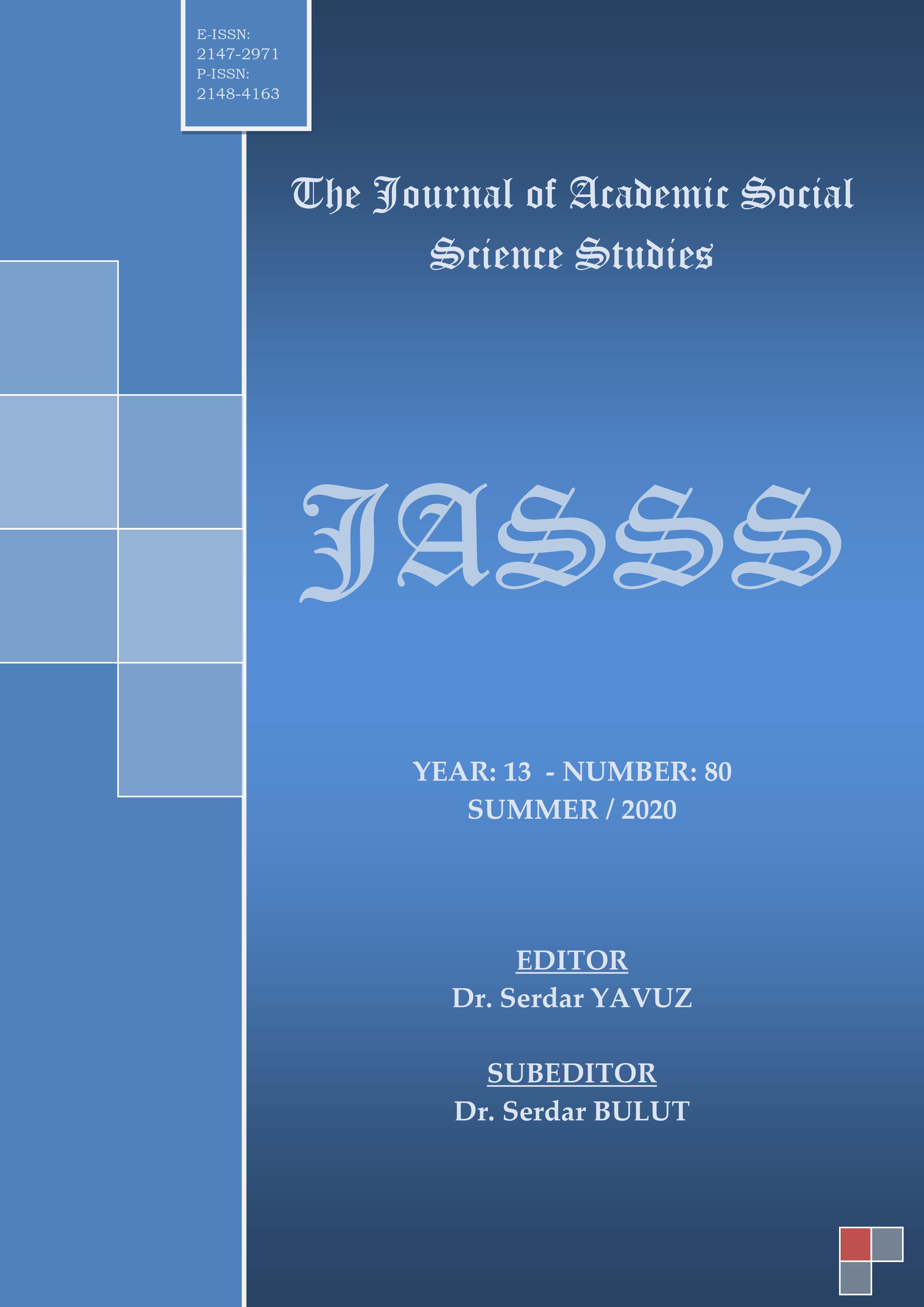SAĞLIK ALANINDA ÖNLİSANS DÜZEYİNDE EĞİTİM GÖREN VE ENGELLİLERLE ÇALIŞAN ÖĞRENCİLERİN ENGELLİLERE YÖNELİK TUTUMLARININ BELİRLENMESİ
Author :
Abstract
Tanımlayıcı olarak planlanan bu çalışma, engellilerle çalışan öğrencilerin engellilere yönelik tutumlarını belirlemek amacıyla yapılmıştır. Araştırmanın evrenini, Yozgat Bozok Üniversitesi ve Bartın Üniversitesi Sağlık Hizmetleri Meslek Yüksekokulu Yaşlı Bakımı, Çocuk Gelişimi ve Evde Hasta Bakım Programı 2. sınıf öğrencileri oluşturmuştur. Araştırmaya toplam 362 öğrenci gönüllü olarak katılmış, çalışmaya katılım oranı %86,2 olarak gerçekleşmiştir. Veriler tanıtıcı bilgiler formu ve tutumları belirlemeye yönelik ‘Yetersizlikten Etkilenmiş Kişilere Yönelik Tutum Ölçeği’ (YEKYTÖ) ile toplanmıştır. Öğrencilerin YEKYTÖ’den aldıkları puan ortalaması 55.30±12.32 (kızlarda 55.580±12.271, erkeklerde 54.154±12.532) bulunmuştur. Öğrencilerin YEKYTÖ puan ortalamalarında cinsiyet, gelir durumu, ailede engelli birey varlığı ve öğrenim gördüğü programa göre fark bulunmamıştır. Ölçek puan ortalamaları ile anne öğrenim durumu ve baba öğrenim durumu arasında istatistiksel fark saptanmıştır (sırasıyla F=3.36, p=0.036; F= 3,47, p=0.032). Anne-baba öğrenim düzeyi yüksek olanlarda tutumlar daha olumlu bulunmuştur. Öğrencilerin %17,1’i engelli bireye bakım vermekten korku-tedirginlik duygusu, %15,3’ü acıma duygusu yaşadığını belirtmiştir. Öğrencilerin tutumlarının genel olarak olumlu olduğu belirlenmiş, engelli bireylerle çalışırken yaşadıkları olumsuz duygularla baş edebilmeleri için eğitim sürecinde daha yakın rehberlik ve desteğe gereksinimleri olduğu sonucuna varılmıştır.
Keywords
Abstract
This descriptive study was carried out to determine the attitudes of students working with people with disabilities towards people with disabilities. 2nd grade students studying in Yozgat Bozok University and Bartın University Health Services Vocational School Elderly Care, Child Development and Home Patient Care Program constituted the population of the study. A total of 362 students voluntarily participated in the study and the participation rate was 86.2%. The data were collected using the introductory information form and the "Attitudes toward Disabled Persons Scale” (ATDP) aimed at determining the attitudes. The mean score of the students from ATDP was found to be 55.30±12.32 (55.580±12.271 for females and 54.154±12.532 for males). There was no difference in the mean score of ATDP of the students according to gender, income, presence of disabled individuals in the family and the program they studied. A statistically significant difference was found between the mean scores of the scale and maternal educational status and paternal educational status (F=3.36, p=0.036; F= 3.47, p=0.032, respectively). Attitudes were found to be more positive in parents with higher educational level. While 17.1% of the students stated that they had the feeling of fear-uneasiness with respect to providing caring for people with disabilities, 15.3% of them stated that they had the feeling of mercy. It was determined that the attitudes of the students were generally positive, and it was concluded that they needed closer guidance and support in the education process to be able to cope with the negative emotions they had while working with people with disabilities.
Keywords
- Altıparmak, S. ve Yıldırım Sarı, H. (2012). Manisa İlinde Engelli Bireylere Karşı Toplumsal Tutum. Anadolu Psikiyatri Dergisi, 0(13), 110-116
- Bilge, A. Genç, R. Nişli, İ. (2005). Toplumsal Bir Sorun Olan Engellilik ve Hemşirelik Yaklaşımı. Ege Üniversitesi Hemşirelik Yüksek Okulu Dergisi, 21(2), 181-190.
- Birleşmiş Milletler Engelli Kişilerin Haklarına Dair Uluslararası Sözleşmesi. https://treaties.un.org/Pages/Home.aspx, (Erişim Tarihi: 24.04.2018).
- Burcu, E. (2011). Türkiye’de engelli bireylere ilişkin kültürel tanımlamalar: Ankara örneği. Hacettepe Üniversitesi Edebiyat Fakültesi Dergisi, 28 (1),s. 37-54.
- Çömez, T. Altan Sarıkaya, N. (2017). Hemşirelik Fakültesi Öğrencilerinin Engelli Bireyleri Damgalamaya İlişkin Düşünceleri ve Uygulamaları. G.O.P. Taksim E.A.H. JAREN, 3(3):145-152.
- Devlet İstatistik Enstitüsü Başkanlığı (2004). Türkiye Özürlüler Araştırması 2002. Ankara: Devlet İstatistik Enstitüsü Matbaası.
- Ergün, M. (2005). Ayrımcılık ve Özürlüler. Öz-veri Dergisi, 2(1).
- Horner-Johnson, W.; Keys, C.; Henry, D.; Yamaki, K.; Oi, F.; Watanabe K, et al. (2002). Attitudes of Japanese Students toward People with Intellectual Disability. J Intellect Disabil Res, 0(46), 365378.
- Ildız, G.İ. ve Tezel, D. (2018). Türkiye’de Engelli Bireylere Yönelik Tutumlara İlişkin Çalışmaların İncelenmesi. Uluslararası Bilimsel Araştırma Dergisi, 3(2), 599-609.
- Kaner, S. ve diğerleri. (2010). Toplum Özürlülüğü Nasıl Anlıyor? Ankara: TC. Başbakanlık Özürlüler İdaresi Başkanlığı.
- Kargın, T. ve Bayındık, B. (2002). Kaynaştırma Ortamındaki İşiten Öğrencilerin İşitme Engelli Akranlarına Yönelik Tutumlarının Çeşitli Değişkenlere Göre İncelenmesi. Ankara Üniversitesi Eğitim Bilimleri Fakültesi Özel Eğitim Dergisi, 3(2).
- NDA. (2007). Public Attitudes to Disability in Ireland in 2006. Dublin: NDA.
- Özyürek, M. (2013). Engellilere Yönelik Tutumların Değiştirilmesi, (4. Baskı). Ankara: Kök Yayıncılık.
- Şahin, H. ve Bekir, H. (2016). Üniversite Öğrencilerinin Engellilere Yönelik Tutumlarının Belirlenmesi. Türkiye Sosyal Araştırmalar Dergisi, 0(3), 767-79.
- Tervo RC, Palmer G. (2004). Health Professional Student Attitudes Towards People with Disability. Clin Rehabil, 0(18), 908-915.
- Thompson, T.L.; Emrich, K. ve Moore G. (2003). The effect of Curriculum on the Attitudes of Nursing Students Toward Disability. Rehabil Nurs, 0(28), 27-30.
- TUİK. (2010). Özürlülerin Sorun ve Beklentileri Araştırması. file:///C:/Users/w7/Downloads/2685989602273963503..pdf (ErişimTarihi: 17.04.2018)
- Ünal, V. ve Yıldız, V. (2017). Üniversite Gençliğinin Engellilere Yönelik Tutumlarının İncelenmesi: Sivas Örneği. International Journal of Social Science 0(57), 341-358.
- World Health Organization. http://www.who.int/topics/disabilities/en/ (Erişim Tarihi: 14.03.2018).
- Yıldırım Sarı, H.; Bektaş, M. ve Altıparmak, S. (2010). Hemşirelik Öğrencilerinin Engellilere Yönelik Tutumlarının Belirlenmesi. Yeni Tıp Dergisi, 0(27), 80-83.





